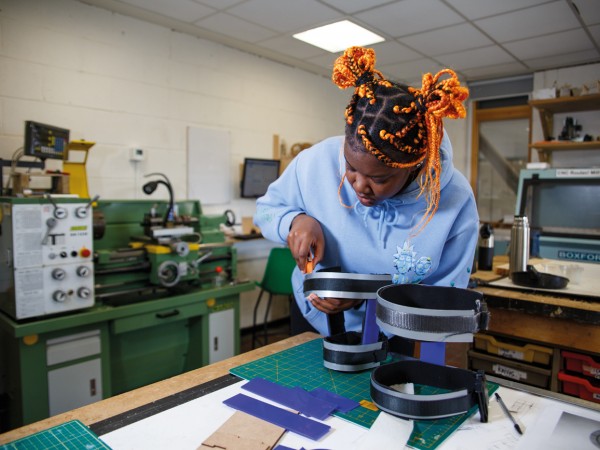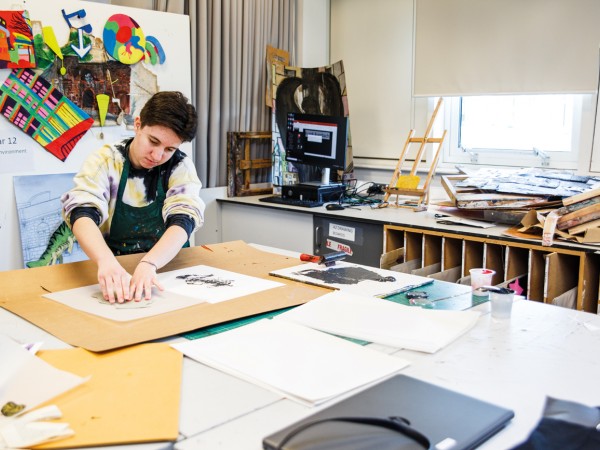Solve problems and shape our future with AAQ Engineering BTEC course. The Pearson BTEC Level 3 National Extended Certificate in Engineering (AAQ) provides a comprehensive foundation for anyone interested in pursuing a career in the engineering sector and keeping up-to-date with the skills and knowledge needed by engineering employers.
This course will equip you with both theoretical understanding and problem solving skills, preparing you for university, apprenticeships, or employment in fields such as mechanical, electrical, civil, or aerospace engineering.
The course will also enable you to develop and demonstrate transferable skills including:
- Managing yourself
- Effective learning
- Interpersonal skills
- Solving Problems
- Digital Skills
AAQ Engineering is a course with a heavy workload of independent coursework, and so students should be advised not to select three creative/ heavy coursework loaded subjects. To support the course and student’s understanding of the industry, work experience is highly advised.
Some career paths such as engineering degrees or higher apprenticeships may also require Maths or Physics A-level.
Please note: should you not meet the course requirements in Maths and Science you may choose Product Design
Course content
First Year
Students will cover the theory content including essential Engineering Principles skills (Maths & Physics) for the exams, including 4 ½ hours home learning per week. It is expected that students will take the exams during the course to allow them to focus on revising other subjects in the summer of year 2.
To enable students to develop the industry standard skills they need for visual communication and virtual testing, students are expected to work through an additional online CAD course that covers software such as SOLIDWORKS and Google SketchUp.
Second Year
In year 2 students will complete two pieces of coursework based on industry-based scenarios. Students need to take a project management approach to their coursework and lead themselves through the solving of problems. These tasks are perfect to present at interview and to explore career options for their future.
Topics
You will gain essential skills and knowledge in areas such as:
- Engineering sectors and job roles
- Engineering principles (the physics behind engineering)
- Mechanical and electrical systems
- Emerging technologies
- Engineering project management
- CAD (Computer-Aided Design)
- Engineering Design
- Health and safety regulations in engineering
- Sustainability
First Year
Students will cover the theory content including essential Engineering Principles skills (Maths & Physics) for the exams, including 4 ½ hours home learning per week. It is expected that students will take the exams during the course to allow them to focus on revising other subjects in the summer of year 2.
To enable students to develop the industry standard skills they need for visual communication and virtual testing, students are expected to work through an additional online CAD course that covers software such as SOLIDWORKS and Google SketchUp.
Second Year
In year 2 students will complete two pieces of coursework based on industry-based scenarios. Students need to take a project management approach to their coursework and lead themselves through the solving of problems. These tasks are perfect to present at interview and to explore career options for their future.
Topics
You will gain essential skills and knowledge in areas such as:
- Engineering sectors and job roles
- Engineering principles (the physics behind engineering)
- Mechanical and electrical systems
- Emerging technologies
- Engineering project management
- CAD (Computer-Aided Design)
- Engineering Design
- Health and safety regulations in engineering
- Sustainability
Progression
Students can develop their studies through a range of higher education courses or apprenticeships in engineering related fields. Students will have access to careers in many fields of engineering including aerospace, mechanical, civil, electrical/electronic or related roles such as project management. Previous students in the department have gained apprenticeships with companies including GKN, Airbus, Babcock, Integral and Rolls Royce amongst others or studied degree subjects such as Automotive Engineering, Robotics and Architecture. This course is especially aimed at students planning to progress to university to study engineering disciplines, pursue higher level apprenticeships, or enter employment within the engineering sector, including roles in design, project management or technical support.
Students can develop their studies through a range of higher education courses or apprenticeships in engineering related fields. Students will have access to careers in many fields of engineering including aerospace, mechanical, civil, electrical/electronic or related roles such as project management. Previous students in the department have gained apprenticeships with companies including GKN, Airbus, Babcock, Integral and Rolls Royce amongst others or studied degree subjects such as Automotive Engineering, Robotics and Architecture. This course is especially aimed at students planning to progress to university to study engineering disciplines, pursue higher level apprenticeships, or enter employment within the engineering sector, including roles in design, project management or technical support.
Resources
You will have access to a range of resources to support your learning, including:
- Fully equipped engineering workshop and design studio
- Industry-standard CAD and 3D modelling software
- Industry-standard tools and machinery
- CNC machines and 3D printers
- Library resources with engineering textbooks, eBooks, and research materials
- Online learning platforms with video tutorials and interactive content
- Experienced teachers and technician to support with individual problem-solving tasks
Link to specification: https://qualifications.pearson.com/content/dam/pdf/btec-aaqs/engineering/2025/specification-and-sample-assessments/btec-national-level-3-ext-cert-engineering-aaq-specification.pdf
Link to the text book: L3 AAQ BTEC National 2025 Engineering Ext Cert Student Book (Print): Amazon.co.uk: 9781292754871: Books
You will have access to a range of resources to support your learning, including:
- Fully equipped engineering workshop and design studio
- Industry-standard CAD and 3D modelling software
- Industry-standard tools and machinery
- CNC machines and 3D printers
- Library resources with engineering textbooks, eBooks, and research materials
- Online learning platforms with video tutorials and interactive content
- Experienced teachers and technician to support with individual problem-solving tasks
Link to specification: https://qualifications.pearson.com/content/dam/pdf/btec-aaqs/engineering/2025/specification-and-sample-assessments/btec-national-level-3-ext-cert-engineering-aaq-specification.pdf
Link to the text book: L3 AAQ BTEC National 2025 Engineering Ext Cert Student Book (Print): Amazon.co.uk: 9781292754871: Books
Equipment & Charges
Students must also provide the following:
Scientific calculator (not on a phone)
A4 lever arch ring bound folder & 10 tab dividers
A4 lined pad or exercise book for notes
Pen
Sketching Pencil , Rubber , 30cm Ruler , Protractor
Pritt stick
Sellotape
A pair of basic headphones that can plug into the PC
A squared exercise book
Your own copy of the L3 AAQ BTEC National 2025 Engineering Ext Cert Student Book
Optional drawing equipment such as a fine liner pen
Access to a PC at home will be a huge advantage as you will be able to download CAD software and work on coursework more easily. Students will also be required to pay around £10 per year towards materials for their coursework project and home access to 3D modelling software. Students must provide the equipment below including buying a book at a cost of approx. £40. The cost of any trips will be the responsibility of the student. Financial assistance is available if required through the student bursary scheme, this should be applied for as soon as possible.
Students must also provide the following:
Scientific calculator (not on a phone)
A4 lever arch ring bound folder & 10 tab dividers
A4 lined pad or exercise book for notes
Pen
Sketching Pencil , Rubber , 30cm Ruler , Protractor
Pritt stick
Sellotape
A pair of basic headphones that can plug into the PC
A squared exercise book
Your own copy of the L3 AAQ BTEC National 2025 Engineering Ext Cert Student Book
Optional drawing equipment such as a fine liner pen
Access to a PC at home will be a huge advantage as you will be able to download CAD software and work on coursework more easily. Students will also be required to pay around £10 per year towards materials for their coursework project and home access to 3D modelling software. Students must provide the equipment below including buying a book at a cost of approx. £40. The cost of any trips will be the responsibility of the student. Financial assistance is available if required through the student bursary scheme, this should be applied for as soon as possible.
Methods of teaching, learning and assessment
The course combines teaching methodologies such as, collaborative small group discussions and problem solving, whole class questions and answer activities, exam questions and some hands-on project-based learning, to encourage students to actively engage with real-world design and develop their problem-solving skills. Students must also engage in independent reading, Maths, CAD and project work between lessons for 4 ½ hours each week. Regular feedback is provided in a variety of ways including tests, self and peer assessment and small group support is available where necessary.
Methods of Assessment
Your progress will be assessed through a combination of coursework and exams. The course uses:
- Two coursework assignments: Based on real-world engineering scenarios, focusing on problem-solving and application of theory.
- Two external exams: Testing your understanding of core engineering principles.
- Portfolio development: Coursework and other tasks can be collected to present at interviews.
Unit 1
Engineering Principles (Physics)
Exam
33%
Unit 2
Engineering Applications
Exam
17%
Unit 3
Engineering Design
Coursework
33%
Unit 2
Engineering Project
Coursework
17%
Methods of teaching and learning
You will experience a variety of teaching methods, including:
- Classroom-based learning: Gain theoretical knowledge through interactive lessons and independent tasks.
- Practical workshops: Learn hands-on skills and develop understanding through use of CAD software, models, kits, tools and equipment.
- Group work and projects: Collaborate with peers on real-life engineering projects.
- Independent study: Conduct research, practice exercises, complete coursework and do further reading to deepen your understanding of engineering concepts. (4 ½ hours every week)
The course combines teaching methodologies such as, collaborative small group discussions and problem solving, whole class questions and answer activities, exam questions and some hands-on project-based learning, to encourage students to actively engage with real-world design and develop their problem-solving skills. Students must also engage in independent reading, Maths, CAD and project work between lessons for 4 ½ hours each week. Regular feedback is provided in a variety of ways including tests, self and peer assessment and small group support is available where necessary.
Methods of Assessment
Your progress will be assessed through a combination of coursework and exams. The course uses:
- Two coursework assignments: Based on real-world engineering scenarios, focusing on problem-solving and application of theory.
- Two external exams: Testing your understanding of core engineering principles.
- Portfolio development: Coursework and other tasks can be collected to present at interviews.
|
Unit 1 |
Engineering Principles (Physics) |
Exam |
33% |
|
Unit 2 |
Engineering Applications |
Exam |
17% |
|
Unit 3 |
Engineering Design |
Coursework |
33% |
|
Unit 2 |
Engineering Project |
Coursework |
17% |
Methods of teaching and learning
You will experience a variety of teaching methods, including:
- Classroom-based learning: Gain theoretical knowledge through interactive lessons and independent tasks.
- Practical workshops: Learn hands-on skills and develop understanding through use of CAD software, models, kits, tools and equipment.
- Group work and projects: Collaborate with peers on real-life engineering projects.
- Independent study: Conduct research, practice exercises, complete coursework and do further reading to deepen your understanding of engineering concepts. (4 ½ hours every week)
Enrichment
Industry visitors and college alumni work with students in college to support their learning. We also encourage students to make contact with industry experts to support their coursework and work experience can be useful for this.
Industry visitors and college alumni work with students in college to support their learning. We also encourage students to make contact with industry experts to support their coursework and work experience can be useful for this.
Where can this course lead?
Engineering has been added to My Courses
Loading...


